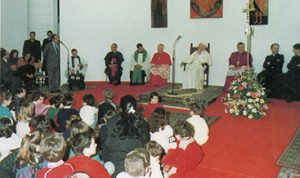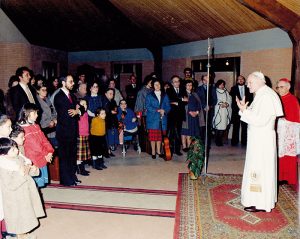Visit to the parish of St. Mary Goretti, January 31, 1988
St. John Paul II
Rome, January 31, 1988
THE COURAGE OF FAITH BORN WITH BAPTISM CAN FACE THE DECHRISTIANIZATION OF EUROPE
We present here the speech that the Holy Father has delivered:
I thank you for this meeting, and for all the testimonies you have given. Listening to you and meeting you, I always think of the catechumenate, and not only in a historical context. Certainly, the catechumenate pertains to the history of the early and missionary church, but through your ‘Way’ and through your experiences, one can see what a treasure the catechumenate has been for the Church as a method of preparation for baptism. When we study baptism, when we administer this fundamental sacrament of our faith, when we read St Paul’s words to the Romans, we see ever more clearly that its practice nowadays has become increasingly inadequate and superficial. If we consider the sacramental nature of baptism, and consider the baptismal promises which, in their content, constitute a completely new program of life, the life of Christ, all this is practiced and fulfilled in the liturgy of the Church today. But at the same time, we can see how without a prior catechumenate, this practice becomes insufficient and inadequate for that great mystery of faith and God’s love which is the sacrament of Baptism: immersion in the death of Christ and his resurrection which is immersion in the very life of God, immersion in the Holy Trinity.

Naturally, there is an explanation for the circumstances which caused the catechumenate of the early, missionary Church to disappear with time, as baptism took place more and more in families where parents, urged on by faith, wished to have their infants baptized. Certainly these children could not be prepared for baptism with the methodology of the catechumenate. They were too young. This methodology, however, has been kept alive in mission countries. Sometimes it seems that the faith of those neophytes, of those new Christians of Africa, and of the other countries of the world, who have to undergo a catechumenal experience quite similar to the experience of the early catechumenate lasting for more than two years, is more mature. It seems to me that they themselves become more mature Christians than we are – we who belong to nations, countries who boast of an old-established Christianity where the catechumenate, in its primitive and missionary sense, has disappeared. Of course that catechumenate didn’t completely disappear. It has been replaced by a catechesis carried out by the Church, through instruction, teaching and through Christian education in the family. All this is an equivalent of the catechumenate in the early and missionary sense of the word. But this is something done after the sacrament. All of you belong to the category of Christians because all of you have received baptism as it is received today: in the family, in the parish, in the contemporary Church.
However, I have to say that your Way is striking – and indeed the word ‘Way’ is very appropriate; through your Neocatechumenal Way one can almost reconstruct what was once the true catechumenate, and even go deeper into it. For this is how we arrive at receiving all the fruits of baptism lived, just as they were lived by the early communities, by the early Christians, by the first generation of Christians who were ready to face everything, even martyrdom for Christ, and who led lives of great fidelity. Of course, they were sinners too, because man, even after baptism, remains a potential sinner. However, there was a tremendous strength in this baptism, in this Christian life of the first Christians, which, in times of hostility and opposition, of persecution, of paganism, of a pagan and very worldly culture – we know well what the life of Rome was like in those early years of the Christian era – was able to give life to a Christianization which spread not only among people, among families, but reached out to entire nations. Of course, the more Christianization increased in quantity, the more it began to decrease in quality.
Certainly today, especially in countries where Christianity is long established, particularly the European countries, we sense the exhaustion of our inner Christianity, of what should be the fruit of our baptism. Baptism is a sacrament that contains the program of the entire Christian life. Of course, it is not the only sacrament, but it is the first and fundamental sacrament. We know very well that a building grows on its foundations.
It is often said, and often we read too, that baptism, our baptism, must last our whole life long, must bear fruit throughout our life. But in our environment, in our countries, in our traditionally Christian society, often we see the opposite; in Rome, too, we see this. We are living in a period of dechristianization. It seems that the faithful, those baptized years ago, are no longer mature enough to oppose secularization and the ideologies which are contrary not only to the Church, to the Catholic religion, but also to religion in general; they are atheistic, indeed anti-theist. You, with your Neocatechumenal Way, in different environments, try to rebuild what has been broken down: you seek to rebuild it in a more authentic way, that, I would say, approaches the experience of the early Church. This is how I see the origins of the Neocatechumenate, of your Way. Someone – I don’t know if it was Kiko or someone else – asked himself: “Where did the strength of the early Church come from, and where does the weakness of today’s Church-a Church with much greater numbers – come from?” I believe he found the answer in this Way. This is what I think, having lived some moments with you.

I hope you will continue in this Way, to continue to accept all the demands which it makes, because it is not a short Way. If you consider the missionary catechumenate, it sometimes looks hard – four years! You are more demanding; yours lasts seven years or more! So then I wish that you will continue always to be demanding in your Way, and I hope above all that you continue to produce all these fruits, because in you, among your communities, it is evident how all the fruits of the Holy Spirit grow from baptism, all the charisms of the Holy Spirit, all vocations, the whole authenticity of the Christian life in marriage, in the priesthood and all the various professions, finally in the world. You need courage to take your experience, your witness, into the more dechristianised environments of the world. But this is providential, because such environments cannot be approached in any other way; those human communities so destroyed, so disintegrated, so far, not only from faith, but from being human. They can only be approached with a great experience of faith, with a deep conviction, with a life entirely permeated by the Holy Spirit.
I hope that you may receive all these fruits in this parish, which seems to me to be based on the Neocatechumenal experience. I think there is a way to rebuild the parish on the basis of the Neocatechumenal experience. Of course, this method cannot be imposed on everybody; but if there are many candidates, then why not? It is authentic and is consistent with the very nature of the parish, because just as each one of us Christians grows from baptism, so does the Christian community grows from baptism. The Church grows from baptism; she grows in the Eucharist, yes; but she grows from Baptism, for there is no Eucharist without Baptism. The parish is a basic community in the Church. It can grow authentically in the experience and on the basis of the Neocatechumenal experience; it would be like the renewal of the early community that grew out of the catechumenal experience.
May the Lord bless you, my dearest ones, may he bless your families, bless your candidates for the priesthood and the seminarians from ‘Redemptoris Mater’, bless your young people and your children who, thanks be to God, are numerous. They are also a cause for great hope because the world, secularized, dechristianised, agnostic, which no longer has faith in God, is losing faith in itself, is losing faith in man. How else can the falling birth rate be explained? Indeed, how else to explain the anti-birth mentality of communities, of nations, of groups, and of political circles? The explanation is in the lack of faith in man. But this lack of faith in man derives from a lack of faith in God. Man has his dimension, his origin and this origin of his is in God himself because man has been created in God’s image and likeness. This explains who man is, how he can live and how he can die. You need courage to live in this world and in this meeting with these families and these itinerants I see a sign of Christian courage.